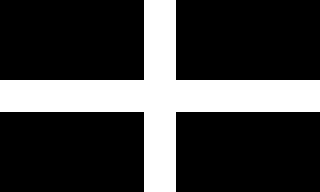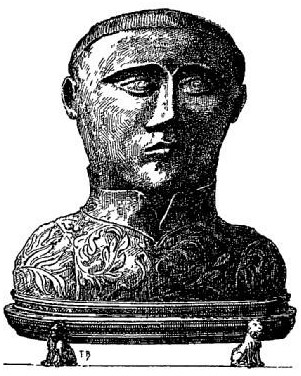This article needs additional citations for verification .(September 2021) |
Abran | |
|---|---|
| Hometown | Brittany |
| Feast | 8 May |
Saint Abran (Breton for 'Abraham'), was a 6th-century Irish hermit in Brittany.
This article needs additional citations for verification .(September 2021) |
Abran | |
|---|---|
| Hometown | Brittany |
| Feast | 8 May |
Saint Abran (Breton for 'Abraham'), was a 6th-century Irish hermit in Brittany.
Abran was born in Ireland and was a brother of Gibrian. [1] Abran and Gibrain traveled to Brittany with their siblings. The five brothers and three sisters chose a life of devotion to God in consecrated religious life. Abran lived in a hermitage on the Marne River, which had been given to him by Saint Remigius.
Abran and his siblings are all considered saints for their positive Christian influence upon the Breton people.
Saint Abran's feast day is 8 May on the Western Rite Orthodox and Roman Catholic Church calendars.

Brittany is a peninsula, historical country and cultural area in the north-west of modern France, covering the western part of what was known as Armorica during the period of Roman occupation. It became an independent kingdom and then a duchy before being united with the Kingdom of France in 1532 as a province governed as a separate nation under the crown.

Gwen Teirbron was a Breton holy woman and wife of Fragan who supposedly lived in the 5th or 6th century. Her epithet is Welsh for '(of the) three breasts'.

Saint Piran's Flag is the flag of Cornwall. The earliest known description of the flag, referred to as the Standard of Cornwall, was written in 1838. It is used by some Cornish people as a symbol of their identity.


Paul Aurelian was a 6th-century Welshman who became first bishop of the See of Léon and one of the seven founder saints of Brittany. He allegedly died in 575, rumoured to have lived to the age of 140, after having been assisted in his labors by three successive coadjutors. This suggests that several Pauls have been conflated. Gilbert Hunter Doble thought that he might have been Saint Paulinus of Wales.

Saint Tudwal, also known as Tual, Tudgual, Tugdual, Tugual, Pabu, Papu, or Tugdualus (Latin), was a Breton monk, considered to be one of the seven founder saints of Brittany.

Brioc was a 5th-century Welsh holy man who became the first abbot of Saint-Brieuc in Brittany. He is one of the seven founder saints of Brittany.

The Bretons are a Celtic ethnic group native to Brittany, north-western France. They trace their heritage to groups of Brittonic speakers who emigrated from southwestern Great Britain, particularly Cornwall and Devon, mostly during the Anglo-Saxon settlement of Britain. They migrated in waves from the 3rd to 9th century into Armorica, which was subsequently named Brittany after them.

Winwaloe was the founder and first abbot of Landévennec Abbey, also known as the Monastery of Winwaloe. It was just south of Brest in Brittany, now part of France.

Locronan is a commune in the Finistère department of Brittany in north-western France, with a population of 800.

Saint Carantoc, also anglicized as Carantock, Carannog and by other spellings, was a 6th-century abbot, confessor, and saint in Wales and the West Country. He is credited with founding Llangrannog, Ceredigion, Wales and St Carantoc's Church, Crantock. His name is listed amongst the Cornish Saints. Carantoc's is one of five insular saints' lives and two Breton ones that mention Arthur in contexts that may be independent of Geoffrey of Monmouth's Historia Regum Britanniae. He is venerated by the Eastern Orthodox Church and Roman Catholic Church.

Saint Budoc of Dol was a Bishop of Dol, venerated after his death as a saint in both Brittany and Devon. Saint Budoc is the patron of Plourin Ploudalmezeau in Finistère where his relics are preserved. His feast day was celebrated on 8 December, the date still used in Devon, but in Brittany this was moved to 9 December.

Tudyof Landevennec was a Breton saint of the 5th or 6th century. He was a hermit who founded monasteries at Landévennec in Brittany, France and in Cornwall, England. The village of St Tudy in Cornwall is named for him. He may have been a disciple of Maudez, after whom St Mawes is named. His companions may have included Corentinus and Brioc. Île-Tudy, on the mouth of the Odet, is named after him.

Saint-Abraham is a commune in the Morbihan department of Brittany in north-western France.
Goneri of Brittany was a sixth-century hermit of the church in Britain.

Saint Teilo, also known by his Cornish name Eliud, was a British Christian monk, bishop, and founder of monasteries and churches. He was from Penalun (Penally) near Tenby in Pembrokeshire, south Wales.

Saint Gibrian was an Irish saint associated with Reims and the Marne region.
Sigal, Pierre-André (1969). "Maladie, pèlerinage et guérison au XIIe siècle: Les miracles de saint Gibrien à Reims". Annales: Économies, Sociétés, Civilisations. 24 (6): 1522–39. doi:10.3406/ahess.1969.422186. S2CID 161904401.